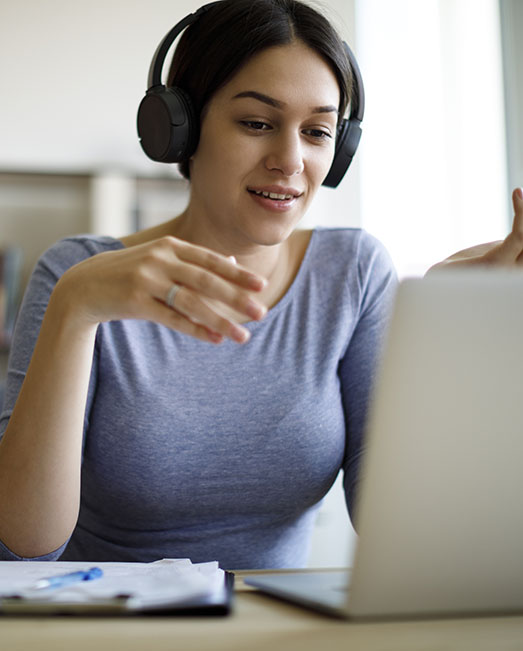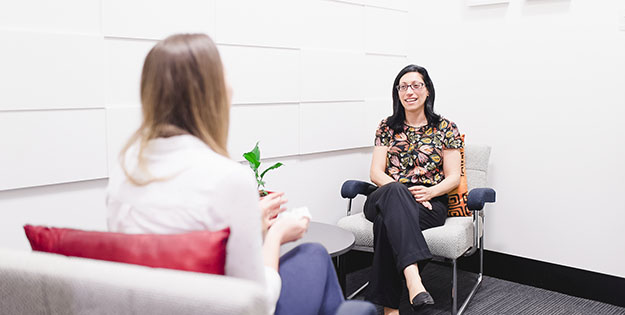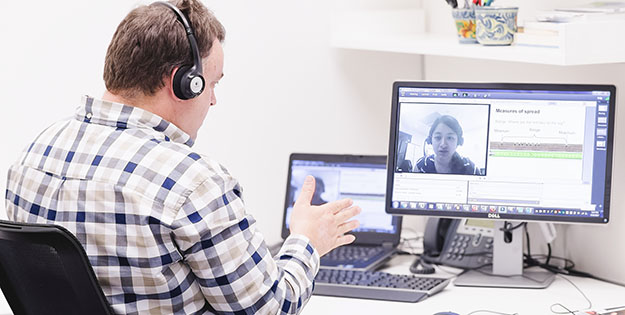Community
Copyright@ Australian Catholic University 1998-2026 | ABN 15 050 192 660 CRICOS registered provider: 00004G | PRV12008
Copyright@ Australian Catholic University 1998-2026 | ABN 15 050 192 660 CRICOS registered provider: 00004G | PRV12008

They’ve been dubbed ‘Generation COVID’ — the cohort of young Australians whose lives have collided head on with the pandemic, disrupting study, work and relationships and provoking a cascade of psychological effects.
These impacts have naturally flowed onto support providers – counsellors, disability advisors and the like – who have experienced increased levels of demand for their services since the early days of the global outbreak.
Counsellors have helped students to manage the emotional consequences of the pandemic, and disability advisors have helped many of them to make adjustments that support academic success.
“The need for counselling support is always high amongst university students, but ordinarily it follows the ebbs and flows of the semester, peaking at exam time or when assessments are due,” says Samantha Whitehead, Acting Manager of ACU’s Counselling and Disability Service, in the Office of Student Success.
“Since the onset of the pandemic, we’ve seen student difficulties remain consistently high throughout the whole semester. So, the demand for support has increased overall, and because COVID-19 has impacted and continues to impact many different aspects of life, it’s been much more extended than we might have predicted early on.”
The pandemic has also had an effect on how the service operates.
With offices on all ACU campuses, it consists of psychologists, social workers and disability support staff offering free consultations and workshops for students experiencing mental health, disability, illness, personal, study or work-related issues.
But with less opportunity for in-person contact with students through COVID-19, staff have been forced to find new ways to deliver support.
“When the restrictions came in, we had to adapt fairly quickly to ensure we were continuing to provide the same level of support for those in need, and we did this with the needs of students in mind,” Ms Whitehead says.

The service swiftly moved to a digital format, with counselling and disability consultations available online or through phone and video conferencing, and recorded presentations or live online sessions often replacing workshops.
“It has meant we’ve had to think differently about how to engage with those in need … how to develop rapport, how to settle in and how to cope with the technology issues that crop up from time to time,” says Ms Whitehead, who points out that the new methods have proved beneficial to some students.
“When people have the capacity to speak to a counsellor or disability advisor from the comfort of their own home, they tend to be quite relaxed and comfortable, and we often find they can disclose information in that setting really easily and appropriately.”
Staff have also observed they’re seeing many students with no prior experience of counselling or psychological treatment.
This is consistent with research showing the pandemic is accelerating a worrying decline in young people’s mental health.
“With things like anxiety, for example, we’ve seen a noticeable increase in people who have approached counselling for the first time,” Ms Whitehead says. “This suggests that, as a direct result of the pandemic, deterioration is occurring at a more significant and rapid rate than normal.”
One of the major destabilising factors of COVID-19 has been the heightened uncertainty over things like study, employment, finances and relationships.
This can trigger a general anxiety that, over time, can prompt intense emotional exhaustion.
“People’s capacity to have control and to have predictability and routine has certainly been decreased over the course of the pandemic,” says Ms Whitehead, a registered psychologist who has worked with young people in community health, private practice and educational settings.
“It’s tiring to be constantly worried, and that can lead to a type of exhaustion and low mood that doesn’t necessarily equate to a diagnosable mental health condition, but nonetheless can have an impact on a student’s capacity to concentrate, to retain information, to study and get good quality sleep so they feel rested and energetic."

This pandemic-induced low mood can also have a flow-on effect to relationships, Ms Whitehead says, especially when people are irritable and emotionally reactive.
“This irritability can affect the quality of our interactions with friends and family, and we’ve definitely seen that with many of the students seeking support,” she says.
“When you combine that low mood and anxiety with physical isolation and social-distancing restrictions, it really has the ability to compound those relationship issues and have a negative effect on many other aspects of life.”
Overall, however, Ms Whitehead says students have responded incredibly well to the demands of the pandemic.
“They’ve had to quickly change the way they study, the way they socialise and work and how they deal with a whole range of disruptions, and through all that, they’ve been incredibly resilient and adaptable.”
At the same time, many will continue to find it hard to deal with the continued uncertainty and upheaval caused by the pandemic.
“As long as the threat of COVID-19 is present, some will have anxieties they’re struggling to cope with, while others might find it difficult to handle the increased freedoms we have as we move closer to what life was like pre-pandemic,” Ms Whitehead says.
“For those students still struggling, seeking help is an adaptive, responsible and appropriate response, and I would encourage students to turn to the Counselling and Disability Service and make use of the support it provides, both through the pandemic and beyond it.”
Find out more about ACU’s Counselling and Disability Service.
For after-hours mental health crisis support, phone ACU’s crisis counselling line on 1300 638 485 or text 0488 884 191.
Copyright@ Australian Catholic University 1998-2026 | ABN 15 050 192 660 CRICOS registered provider: 00004G | PRV12008